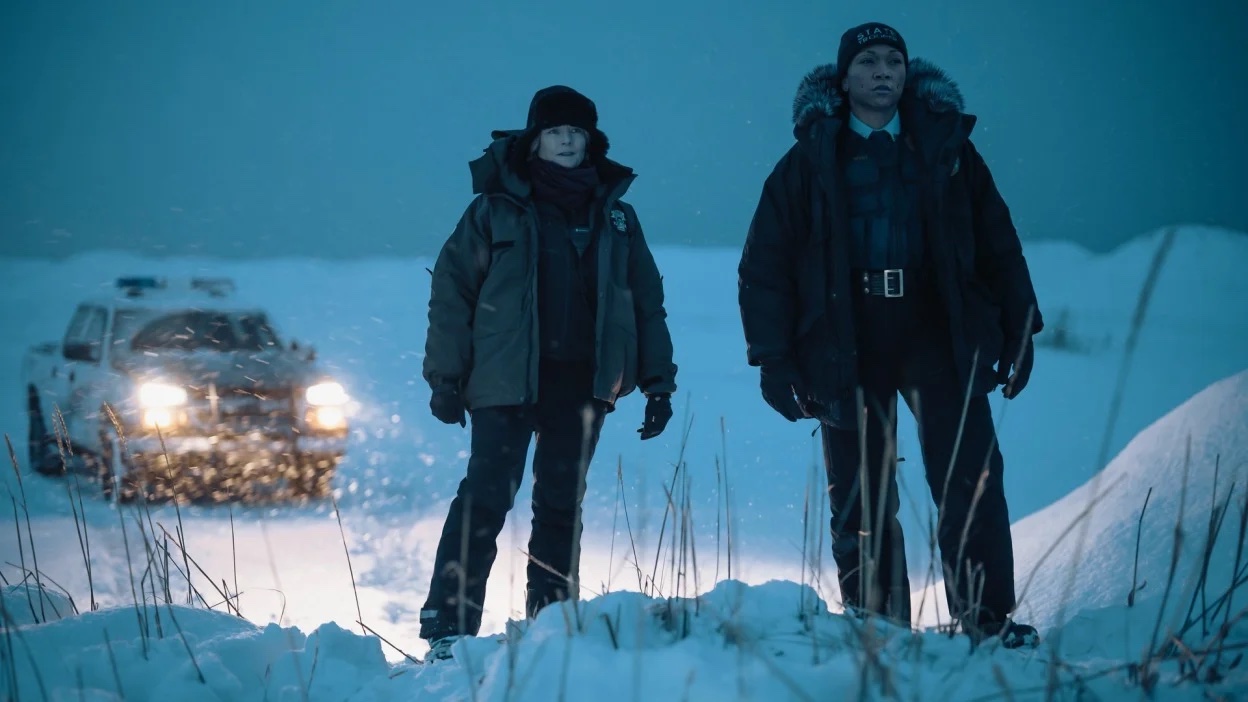In 2014, the first episode of True Detective, created by ambitious genre-fiend Nic Pizzolatto, premiered the same night Matthew McConaughey won a Golden Globe for Dallas Buyers Club. The actor gave an all-time strange speech (overshadowed not long after by an even weirder one) that was perhaps a sign of the rapturous acclaim the show would receive and the impact it would have—a space rock smashing into and scorching the earth and sending out ripples of long-take Steadicam shots and amateur sages. One year later, McConaughey would receive another nod from the Globes for True Detective—time truly flattened to a circle. Or something.
Night Country, the fourth season of the series and the first without significant creative control by Pizzolatto, is written and directed by Issa López, the filmmaker behind 2017’s Tigers Are Not Afraid. It begins with a quote from Robert Chambers (or rather a quote from one of Chambers’ characters) which sets the mood of minacity, an eerie enigma whose answer may be insoluble. Then we get a herd of bad-CG caribou stampeding off a cliff, a cartoonish beginning to a morbid story. Still, it establishes that this season may not be so predictable—a sense that anything can happen here, in the hegemony of unsullied snow, the plumes of breath drifting and dispersing into the sky as we’re pulled deeper into a mysterious murder story that brings to mind the first season of the underrated Fortitude (Christopher Eccleston is, coincidentally, in both). At its best, the hallucinatory aesthetic takes some cues from NBC’s Hannibal, but more prestige-y. You feel the brutal cold here, in this land of white shrouded in perpetual night, with ebony air and stars twinkling like specks of ice, nightmares manifesting, big and chilly.
This season is more influenced by horror than previous ones, with a Tobe Hooper-ish series of flashbulb-brief closeups of human heads protruding from the ice accompanied by that familiar camera sound (echoes, also, of Motel Hell) opening the second episode, contributing to the pervasive ominousness that intensifies as the story unfurls. It has the Blumhouse shine, which you either like or don’t (in this case, I dig it) and an occasional dark sense of humor that elicits not chortles but unease—such as Ferris Bueller, one of cinema’s life-affirming films, bellowing “Twist and Shout” on the TV as the tension swells and threatens to suffocate us in the show’s opening moments. A group of scientists conducting secret research in the ice—very The Thing, or that season one episode of The X-Files with Xander Berkeley—goes missing. Where did they go? What were they doing? And how did a severed tongue end up on the floor, not a drop of blood to be found?
All good things to those that wait—we hope.
From the simmering intensity of McConaughey’s nihilism to the quiet malaise of Mahershala Ali, True Detective has been a triumph of acting. Here, Jodie Foster plays a cop in Alaska, older, maybe wiser, but jaded, the hope of youth abraded like a rock-strewn shore by the thrash of sea, and the fear of futility not so far beneath the surface dry and tight in the cold. She’s angry, but still has her moral compass. She’s the authority in this gelid, haunted realm of white and ice, a chilled sprawl that’s a far cry from the parched beige and Texan drawls of the first season, with its percolating testosterone and southern sleaze.
You feel the brutal cold here, in this land of white shrouded in perpetual night, with ebony air and stars twinkling like specks of ice, nightmares manifesting, big and chilly.
This might be Foster’s best performance since Silence of the Lambs’s Clarice Starling, her seminal turn of incredible inner pain howling behind a facade of professionalism. Thanks to the insights and iniquitous elocutions of a cannibalistic psychiatrist, her desperation to transcend her white-trash life becomes a hopeful courage to do the right thing. This woman, haunted by and beholden to the past she can’t escape trying to make a career, finally earns respect in a vocation rife with boys whose lecherous eyes move sticky over her body, her not-yet-blemished face, still smooth with inexperience. Without Foster’s monumental modesty, the pain lurking just behind gleaming genial eyes, Anthony Hopkins’s delectable scene chewing might seem the wrong kind of ridiculous instead of the singular sinister suavity, all flagitious enunciation and wicked cleverness that works so beautifully with Foster’s naturalism.
In Night Country, Foster has the bad-ass doggedness that makes her so compelling in Panic Room. She’s the Police Chief of nowhere, and, as is usually the case in these kinds of stories, proves entirely capable. But, like the first season, our protagonist has anger, acrimony, resentment pumping through her heart, dismissing her native Alaskan trooper (former boxer Kali Reis, excellent) with a curt, “Don’t you have a caribou to gut?” And my God, the cursing! This is not Clarice Starling.
Given the nature of the series—the excitement of each loop of plot and slippery reveal, each revelation both smart and dumb—I’m not divulging much of the plot. I won’t deprive you of the thrills and chills it provides. Suffice it to say that Night Country is not, as they say (meaning little), a return to form, as it has a distinctly different feeling from the Pizzolatto era; but it is maybe as good as that first inexplicable season, a spiritual kin with its own identity, another dive into the murk and mendacity of America’s sinister side. FL







